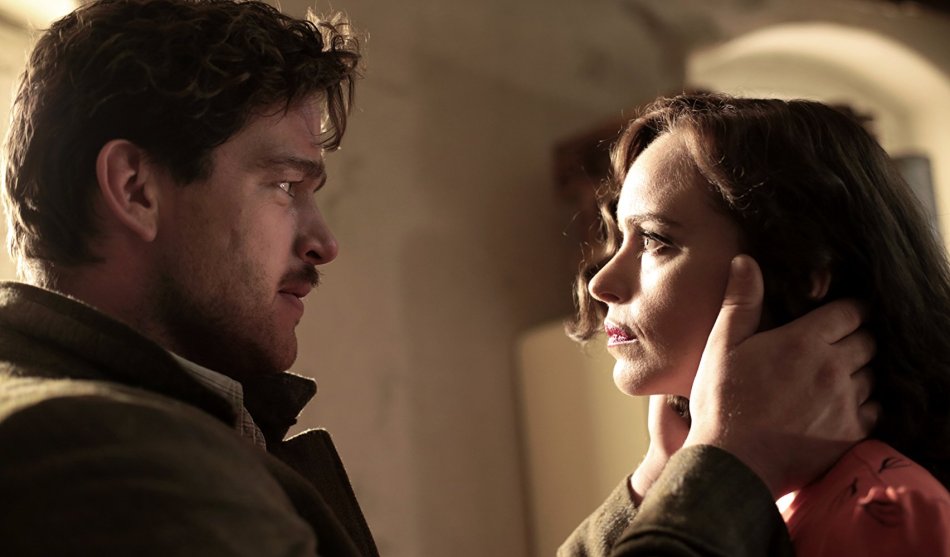At first we see only the eyes, mouth, and ears of Nelly Lenz (Nina Hoss), a recent Auschwitz victim whose face is entirely bandaged. Her entire family died in the Holocaust and she becomes recipient of a large inheritance. For a portion of Phoenix, her friend Lene (Nina Kunzendorf) accompanies her as she experiences facial surgery and healing. The doctor provides Nelly with options of celebrities whose skin tone she could resemble after surgery, but Nelly desires to look like herself before her injuries. When she sees her reflection on a piece of shattered glass following her surgery, she is saddened by how different she looks.
 Nelly and Lene struggle to reconcile the violence and hardship inflicted upon them. Lene cannot listen to German music without recalling past horrors and she insists that her and Nelly relocate to Palestine and use Nelly’s inheritance money to help create a Jewish state in which to reside in peace. Lene is not provided with much characterization- she has only minimal purpose in Phoenix’s narrative and is removed from the film as her involvement declines.
Nelly and Lene struggle to reconcile the violence and hardship inflicted upon them. Lene cannot listen to German music without recalling past horrors and she insists that her and Nelly relocate to Palestine and use Nelly’s inheritance money to help create a Jewish state in which to reside in peace. Lene is not provided with much characterization- she has only minimal purpose in Phoenix’s narrative and is removed from the film as her involvement declines.
Nelly was separated from her husband Johnny (Ronald Zehrfeld) who did not experience the tortures of Auschwitz. Clear evidence suggests that he turned her in to the Nazis to free himself from torture at the concentration camp, but Nelly declines to believe this. She desires that their marriage resume now that she is let free from Auschwitz. Nelly searches for Johnny and finds him as a worker at a nightclub, Phoenix. In their past, Nelly and Johnny were cabaret performers- Nelly would sing and Johnny would play the piano.
When Johnny sees Nelly, he remarks that she looks similar to his old wife and that he has an opportunity for her. Since Nelly’s face was changed through her surgery, he does not recognize her in the slightest. He tells her that if she can pretend that she is his wife, she can claim Nelly’s inheritance money and the two can split her wealth. Nelly agrees so she can spend time with Johnny, telling him her name is Esther, although she forced to be a recluse in his residence so the public does not see her. She is to make her appearance as Nelly.
Johnny tells her about Nelly, describing the way she dressed and makes her practice Nelly’s handwriting. Nelly does this perfectly; Johnny still does not recognize his wife. Over time, Nelly asks Johnny about Nelly’s past and suggests that Johnny may have accidently led the Nazis to their hiding place. She attempts to excuse his crime; he is oblivious that she is his wife.
Perhaps Johnny is also trapped in the past. He cannot grasp that the women he is instructing to act as his wife is, in fact, his wife due to his incapacity to accept his cruelty to her in turning her in to the Nazis. As similarities between Nelly and (what his idea of) his wife continue to arise, he begins to fall in love with her, his romanticized recreation of Nelly.
Christian Petzold‘s Phoenix draws comparison to The Night Porter in that there is an eerie longing for a past that is utterly destroyed by World War II and the Holocaust. Both films portray agonized characters that appear visually uncomfortable every moment on camera. Their characters are in desperate need of fugue. However, Phoenix’s resolution is more ambiguous than that of The Night Porter. At no point is Nelly coerced into appearing as Johnny’s wife and she does retain control of her own fate with little or no consequence no matter her actions. The dark fatalistic elements of The Night Porter that make the film hypnotic are absent in Phoenix. Whether or not Nelly moves away from the past, or even embraces it, is unresolved- Phoenix appears to conclude before its final act. At the very least the title of the film suggests a shift from stasis, an eventual rebirth of Nelly into her own life, by nature of the mythological creature.


0 comments on “Phoenix ★★½”